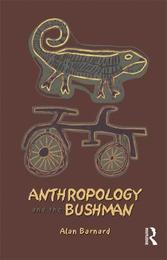
|
Anthropology and the Bushman
Paperback / softback
Main Details
| Title |
Anthropology and the Bushman
|
| Authors and Contributors |
By (author) Alan Barnard
|
| Physical Properties |
| Format:Paperback / softback | | Pages:192 | | Dimensions(mm): Height 234,Width 156 |
|
| ISBN/Barcode |
9781845204297
|
| Classifications | Dewey:305.896 |
|---|
| Audience | | Tertiary Education (US: College) | | Professional & Vocational | |
|---|
|
Publishing Details |
| Publisher |
Bloomsbury Publishing PLC
|
| Imprint |
Berg Publishers
|
| Publication Date |
1 April 2007 |
| Publication Country |
United Kingdom
|
Description
The Bushman' is a perennial but changing image. The transformation of that image is important. It symbolizes the perception of Bushman or San society, of the ideas and values of ethnographers who have worked with Bushman peoples, and those of other anthropologists who use this work. Anthropology and the Bushman covers early travellers and settlers, classic nineteenth and twentieth-century ethnographers, North American and Japanese ecological traditions, the approaches of African ethnographers, and recent work on advocacy and social development. It reveals the impact of Bushman studies on anthropology and on the public.The book highlights how Bushman or San ethnography has contributed to anthropological controversy, for example in the debates on the degree of incorporation of San society within the wider political economy, and on the validity of the case for 'indigenous rights' as a special kind of human rights. Examining the changing image of the Bushman, Barnard provides a new contribution to an established anthropology debate.A PDF version of this book is available for free in open access via the OAPEN Library platform, www.oapen.org
Author Biography
Alan Barnard is Professor of the Anthropology of Southern Africa at the University of Edinburgh.
Reviews'Alan Barnard's fascinating examination of the changing images anthropology has held about the Bushmen of Southern Africa is an important contribution to the history of anthropology and offers rare insight into the lives, struggles and achievements of several generations of ethnographers. An important reading for any course on hunter-gatherers, southern Africa or the history of anthropology.' Jerome Lewis, London School of Economics
|